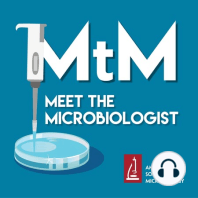29 min listen

066: Insect-pathogenic fungi as fertilizers and mosquito control with Raymond St. Leger
066: Insect-pathogenic fungi as fertilizers and mosquito control with Raymond St. Leger
ratings:
Length:
53 minutes
Released:
Sep 28, 2017
Format:
Podcast episode
Description
Raymond St. Leger describes his work on insect pathogenic fungi. Members of this diverse group of fungi can be found as part of the plant rhizosphere, where they provide nutrients to the plant, and can also be deployed as insect control agents. Raymond discusses his work with communities in Burkina Faso, where he works with officials to educate and gain consent for use of mosquito-killing fungi to control the spread of malaria. Host: Julie Wolf Subscribe (free) on iPhone, Android, RSS, or by email. You can also listen on your mobile device with the Microbeworld app. Julie's biggest takeaways: Insect-pathogenic fungi living in plant roots can pass nitrogen from killed insects to their plant hosts, receiving different carbon nutrients from the plants in return. Fungi harvested after growth on inexpensive materials like chicken droppings are used in agriculture both as fertilizer and as insecticide. Cyclosporine was first discovered in insect-pathogenic fungi. Raymond St. Leger and other scientists working to introduce genetically modified microbes into the environment deeply consider the societal effects of their work, including collaboration with local communities, governmental regulatory bodies, and trusted leaders and tailor their efforts to the regional area. Featured Quotes: "Possibly fungi kill more organisms than any other disease-causing agents." (2:55) "People are interested in how you can utilize a plant-root colonizing Metarhizium as a comprehensive biofertilizer." (14:30) "Put elite Metarhizium onto corn seeds and you can boost the growth of corn by about 30%." (14:50) "Mosquitos and malaria have no friends." (23:17) "If an insect is especially common, then a strain of Metarhizium will specialize to that insect." (24:35) “There’s a lot of different ethical, political, and social concerns we have to address and we have to resolve before any type of genetically manipulated product can be introduced. We even have questions about the meaning of informed consent!" (28: 30) "Synbio-phobia-phobia: the belief that genetic engineers have that people are going to be frightened of their work."(32:00) "In Burkina Faso, you can expect to get more than 200 bites from Anopholes gambiae a day. This is malaria central." (37:58) Links for this episode Raymond St. Leger website at the University of Maryland St. Leger lab research explained in a three-minute video NPR story covering fungal pesticides as alternatives to chemicals Discover Magazine blog on malaria-fighting Frankenfungus CHOMA tidbit: Felix d'Herelle and the Origins of Molecular Biology by Bill Summers (Excerpt of Chapter 3. Epizootics: Locusts in Argentina and Algeria). Send your stories about our guests and/or your comments (email or recorded audio) to jwolf@asmusa.org.
Released:
Sep 28, 2017
Format:
Podcast episode
Titles in the series (100)
MTS10 - Anthony Maurelli - Black Holes and Antivirulence Genes: Tony Maurelli is a professor of microbiology and immunology in the F. Edward Hébert School of Medicine at the Uniformed Services University of the Health Sciences in Bethesda, Maryland. Dr. Maurelli’s major research interest lies in the genetics of bac by Meet the Microbiologist